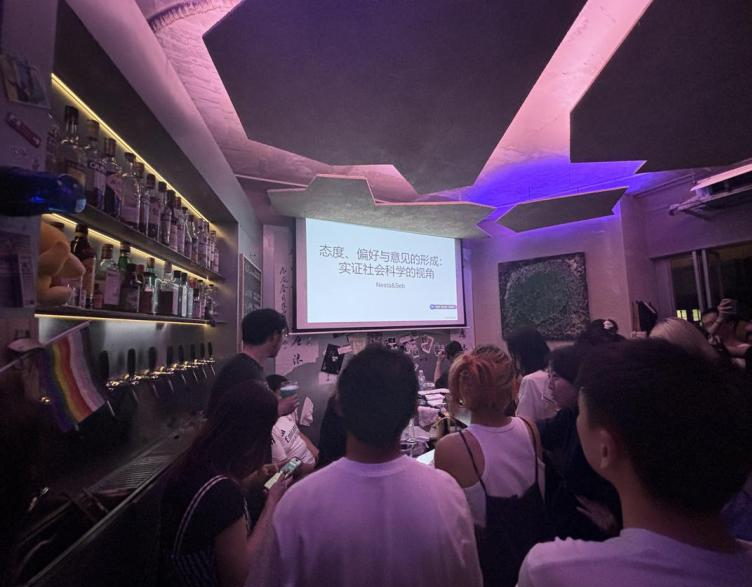
In a nondescript street bar in Shanghai's Wutong district, a lecture is taking place. There are no empty seats in the 30 square meter space, some people take out laptops, and some people make notes on paper.
This is the scene of a lecture at an academic bar in Shanghai. Following the opening of academic bars in Shanghai and Beijing in May, the concept of holding lectures in bars has spread to other major Chinese cities in the past two months, with at least one academic bar now appearing in Guangzhou, Shenzhen, Changsha, Wuhan, Tianjin, Hangzhou and Nanjing.
When this reporter visited the academic bar in Shanghai in late August, there were two lectures going on that day. When I arrived at 6:15 p.m., the first lecture, which started at 7 p.m., was already full. After waiting outside the door for two hours, he took a seat to enter the second lecture.
The topic of the lecture was the formation of social opinions, and the speaker, who is currently studying for a doctorate at an elite US university, used the example of the US election to analyze how elite experts and social media affect the attitudes and opinions of the general public. The speaker also stressed that the content of the lecture has nothing to do with China, "we only discuss the problems of the United States."
In the lecture of more than one hour, the presenter cited academic literature and experimental data many times, and the audience could interrupt and ask questions at any time, and the interactive atmosphere was similar to that of a university seminar.
He Mengru (a pseudonym), a young office worker who participated in the lecture, said in an interview that she originally thought the academic bar was "definitely just a gimmick", but the quality of the lecture was unexpected, and the academic background of the presenter, the topic selection and the content of the lecture were "above the middle".
He Mengru said that the audience's attention and enthusiasm also made her very surprised, "can not say all, but certainly more than 80% of them listened very attentively."
Shi Tongbi, a graduate student in Shanghai, told Lianhe Zaobao that she was not entirely attracted by the content of the lecture, but was more curious about the format and atmosphere, but found it very interesting after attending.
According to the observation of Li Yunfei (a pseudonym), who has served as the keynote speaker in the academic bar for many times, compared with the crowd who follow the trend of punching the card, the real number of people who come to listen to the lecture is more, and some will send their feelings after listening to the Internet, "this means that they have listened to it and understood it, and the effect is good."
Academic bar caught in the "circle of money" question
In the general impression, the scene suitable for academic lectures is often a campus, a bookstore or a coffee shop. The fresh collision between bars and lectures has not only brought heat to academic bars on Chinese social media, but also attracted questions about "circle money", "pseudo-academic" and "arty".
From the point of view of the lecture content, the lectures in academic bars around China are mainly humanities and social sciences, including literature history, ancient painting, women's liberation, and systematic explanation of social science research methods. Most of the speakers are doctoral students in Chinese or overseas universities, and some are university lecturers.
In terms of cost, some academic bars require the purchase of a drink as admission, while others are completely free. Li Yunfei as the main lecture belongs to the latter, he admitted: "This itself is not a grand project, just want to do a few small lectures, no difference with the bookstore lecture."
Xu Jian, a professor at the School of Media and Communication at Shanghai Jiao Tong University, analyzed in an interview with Lianhe Zaobao that the background of the emergence of academic bars is the rise of "new urban youth" with postgraduate degrees in China's first-tier and new first-tier cities.
Xu Jian said that these people have a certain academic foundation, like to "plant grass" on social media, both social fear and social. They are afraid of the very purposeful social dating, but the academic bar is to listen to lectures, and at the same time to make some friends who have a common interest in the same topic, to meet some social needs.
As for whether the academic bar can continue to heat, Xu Jian believes that the academic bar can be popular, but whether it is sustainable remains to be seen. On the one hand, from the perspective of bar profitability, a long lecture will affect the turnover rate; On the other hand, the misalignment of the bar as an emotional consumption space and the academic environment as a more rational one raises the question: "Can we turn the flow of people into commercial cash flow?"
However, Xu Jian also said that for the city, the academic bar's exploration of various Spaces in the city and the creation of diverse cultures are "still very good".

Since 2022, the Fed has cumulatively reduced its balance sheet by $2.4 trillion through quantitative tightening (QT) policies, leading to a near depletion of liquidity in the financial system.
Since 2022, the Fed has cumulatively reduced its balance sh…
On December 11 local time, the White House once again spoke…
Fiji recently launched its first green finance classificati…
Recently, the European Commission fined Musk's X platform (…
At the end of 2025, the situation in the Caribbean suddenly…
The U.S. AI industry in 2025 is witnessing a feverish feast…